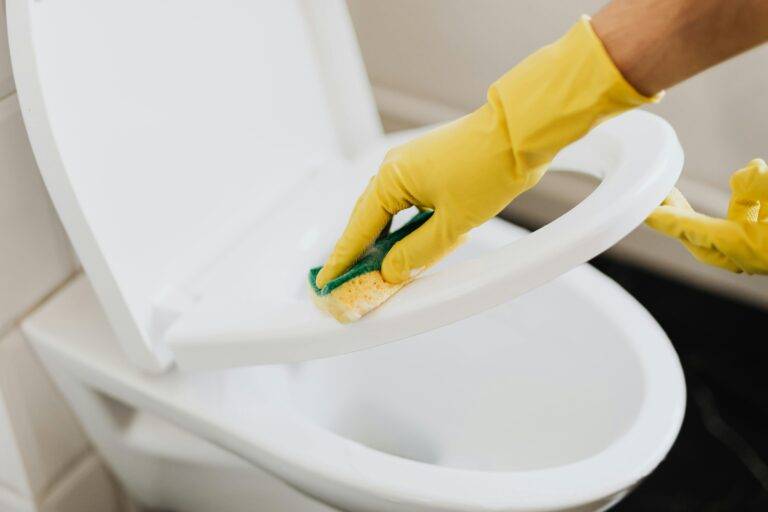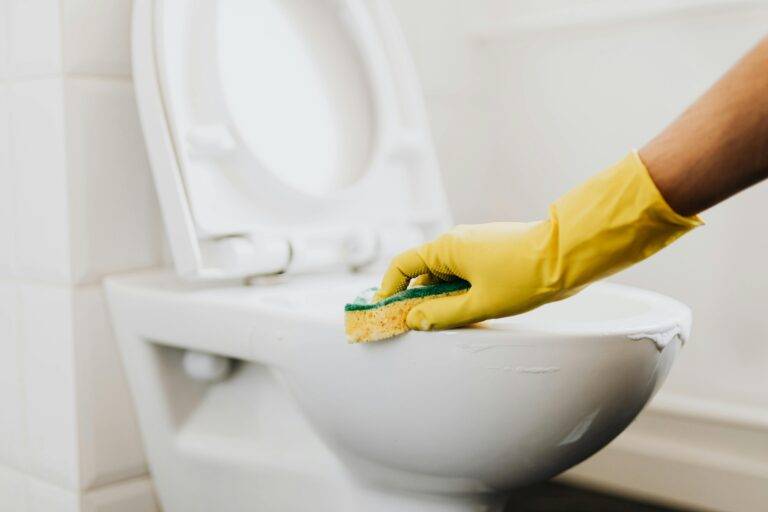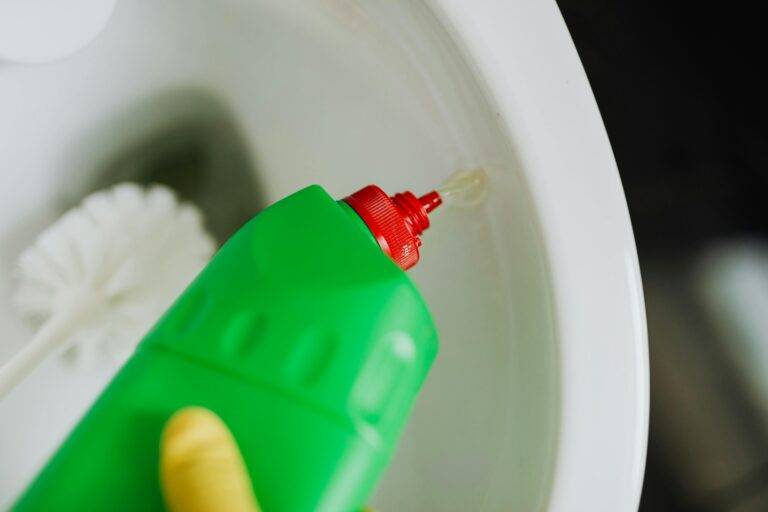Hard water stains can tarnish the beauty of your glass surfaces, making them look unsightly and dirty. These stains occur due to minerals in household water such as calcium and magnesium, which bond to the glass, resulting in mineral deposits that can be challenging to remove12. If left untreated, hard water stains can lead to permanent etching, adversely affecting the clarity of your glass1. In this article, we’ll delve into various methods for effectively removing hard water stains from glass and provide insights into necessary tools, natural remedies, and preventative measures to keep your surfaces looking pristine.
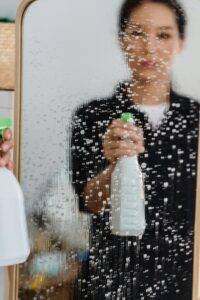
Understanding Hard Water Stains
Hard water stains are a common issue faced by many households, especially in areas with high mineral content in their water supply. These stains form when water evaporates from glass surfaces, leaving behind mineral deposits primarily made of calcium and magnesium. This residual buildup appears as unsightly white or cloudy spots, making glass shower doors, windows, and even glassware look dingy and unkempt3. Frequent exposure to water leads to these stains developing on various glass surfaces, often requiring specific cleaning strategies for effective removal4.
Recognizing how these mineral deposits occur can guide homeowners in addressing the problem promptly. Regular maintenance and cleaning can extend the lifespan and clarity of glass surfaces5. To effectively tackle hard water stains, solutions such as white vinegar or a mixture of vinegar and baking soda can be utilized. These options leverage the acid’s properties to break down deposits, restoring shine to glass surfaces4. Understanding these aspects can ultimately lead to better care and upkeep of your home’s glass features.
Why You Should Remove Hard Water Stains
Removing hard water stains is vital for both aesthetic and functional reasons. These stains accumulate due to mineral deposits from water rich in calcium and magnesium, leaving behind a crusty white residue on glass surfaces6. If ignored, hard water stains can etch the glass, leading to permanent marks that cloud visibility and degrade the surface6. Regular maintenance through removing hard water stains not only preserves the integrity of the glass but also enhances the overall look of your home, which can positively impact its value.
Cleaning experts recommend a proactive approach to glass maintenance. Techniques such as using a vinegar solution or baking soda paste can effectively address tough stains without inflicting etching damage7. Moreover, incorporating a routine cleaning schedule can prevent heavy buildup of hard water stains, ensuring your glass remains clear and beautiful7. An eco-friendly vinegar and water mixture stands out for its effectiveness, affordability, and minimal environmental impact in removing hard water stains from glass6. By maintaining glass surfaces consistently, you not only enhance their clarity but also extend their lifespan.
Tools You’ll Need for Removal
To effectively tackle hard water stain removal, using the right cleaning tools is essential. A spray bottle is necessary for mixing your cleaning solutions, while a squeegee helps achieve a streak-free shine on your glass surfaces. Microfiber cloths are perfect for drying and buffing, preventing scratches while ensuring a clean finish. An old toothbrush or soft-bristled brush can focus on stubborn areas, making it easier to scrub away mineral deposits.
For protection, be sure to wear rubber gloves and consider eye protection in case of splashes. To catch any drips during the process, an old towel works wonders. When it comes to cleaning supplies, distilled white vinegar is a top choice, capable of cleaning windows and glass doors when mixed with distilled water in a 1:1 ratio8. Additionally, using cleaning vinegar, which is 20 percent stronger than typical distilled white vinegar, may be beneficial for heavy hard water stains8.
If you encounter particularly tough stains, creating a baking soda paste—using a ratio of 1 part water to 3 parts baking soda—can enhance your cleaning power. This paste should be left on the surface for about ten minutes before scrubbing it with undiluted vinegar to break down the deposits. Incorporating these glass cleaning supplies into your routine can make all the difference in maintaining clear and beautiful glass fixtures9.
Step-by-Step Guide to Removing Stains
Removing hard water stains is a simple process when you follow this step-by-step glass cleaning guide. First, prepare your cleaning solution by mixing equal parts of distilled white vinegar and warm water in a spray bottle. This effective mixture combats hard water stains, which are largely caused by mineral deposits left on glass surfaces1010.
Next, lay an old towel at the base of the glass to catch any drips that may occur during the cleaning process. Generously spray the solution onto the stained areas and allow it to sit for at least 30 minutes. This waiting time gives the solution a chance to break down the mineral buildup effectively.
Using a soft-bristled brush or cloth, scrub the stained areas in a circular motion to lift the stains. For serious stubborn stains, consider using stronger solutions or commercial glass cleaners that are typically low-pH and highly acidic11. After scrubbing, rinse the glass thoroughly with water.
Finally, utilize a squeegee to eliminate excess moisture from the surface. Dry the glass using a lint-free microfiber cloth to achieve crystal clear results without any streaks, finishing your step-by-step glass cleaning with great satisfaction.
Natural Remedies for Hard Water Stains
Hard water stains can be a nuisance, but using natural cleaning remedies can help address this issue effectively. Vinegar is a well-known option, often recommended for its ability to fight hard water stains. Applying a vinegar solution directly to stained surfaces and allowing it to sit for at least 15 minutes can significantly improve stain removal, making it a reliable cleaning method12.
Another effective strategy is to combine lemon juice with baking soda. This mixture forms a powerful paste that targets stubborn stains, making it an excellent choice among hard water stain solutions. Once applied, let it sit for a few minutes before scrubbing to enhance the cleaning effect.
For those looking for alternative natural cleaning remedies, hydrogen peroxide provides versatility and can be useful in many cleaning scenarios. It is known for its effectiveness in removing hard water stains while being environmentally friendly. These methods not only clean effectively but also minimize impact on the environment.
Regular maintenance plays a crucial role in preventing hard water stains from forming. Wiping down wet surfaces immediately after use can keep faucets, sinks, and showers sparkling clean, reducing the need for extensive cleaning down the line. For more detailed approaches, you might want to check this resource on removing hard water stains for additional insights13.
Commercial Products for Stain Removal
For tackling stubborn hard water stains effectively, homeowners often turn to commercial stain removal products designed for this specific purpose. Regular household cleaning solutions may not always suffice, as hard water stains manifest as white mineral deposits that bond to glass surfaces, making them particularly challenging to remove14. Among the best glass cleaners available, Diamond Magic has gained attention for its unique formula that includes powdered diamonds, which provides powerful stain removal capabilities15. Another favorite in the window cleaning community is EaCo Chem OneRestore, lauded for its effectiveness in breaking down tough stains on a variety of surfaces15.
It’s essential to follow the manufacturer’s instructions for all commercial products for optimal safety and effectiveness. Some products may contain harsh acids that require additional safety precautions, such as gloves and good ventilation, to protect both the user and the glass14. Agencies recommend professional window-specific stain removers over homemade remedies tailored for glass surfaces due to their tested and proven formulas, which deliver consistent results15. Premium brands like Unger, Ettore, and Pulex offer a range of products that include liquid polishes and abrasive solutions, effectively tackling hard water stains and corrosion from glass15.
Using concentrated stain removers is advantageous, as they can often be diluted to suit the cleaning task’s needs, enhancing their versatility15. Products such as the Ettore Stain Remover Kit and the Aggressive Stain Removal Kit from EaCo Chem are especially useful for addressing various hard water stains, calcium deposits, and soap scum14. With consistent use of commercial stain removal products, homeowners can keep their glass surfaces spotless while preventing the buildup of new stains14.
For more severe stains, products like Brite and Clean Ultimate Hard Water Stain Remover® have proven effective, capable of addressing stubborn stains on up to 700 square feet. This product has a history of customer satisfaction, cementing its reputation in the market16. When dealing with hard water stains, utilizing these specialized commercial stain removal products will yield the best results.
Prevention Tips for Hard Water Stains
Preventing hard water stains is just as important as the removal process. Regular maintenance practices, such as drying glass surfaces after water exposure, significantly contribute to avoiding hard water stains. Utilizing a squeegee or microfiber towel can help prevent mineral buildup on glass, as hard water contains high concentrations of magnesium and calcium minerals that lead to water spots17.
Installing a water softener can dramatically reduce the mineral content in your water supply, providing one of the effective stain prevention tips. Additionally, applying water-repellent coatings on glass surfaces can facilitate easier water runoff, further mitigating the chances of these unsightly marks forming. Another proactive approach involves repositioning outdoor sprinklers to avoid spraying windows and planting bushes near windows, which can deflect water spray, helping in avoiding hard water stains18.
One popular technique involves keeping the air circulating in bathrooms to promote quick evaporation of moisture, thus reducing the likelihood of water spots. Regularly wiping down glass after each shower further aids in preventing the buildup of minerals17. Incorporating solutions like mixing equal parts water and vinegar to spray over hard water stains can yield positive results if allowed to sit before wiping clean19.
For ongoing maintenance, consider using a microfiber cloth for cleaning windows, which is known to remove streaks and residue more effectively compared to traditional cloths18. By applying these stain prevention tips, you can keep your glass surfaces looking pristine while reducing the need for more intensive cleaning methods in the future.
Learn more about effective stainprevention.
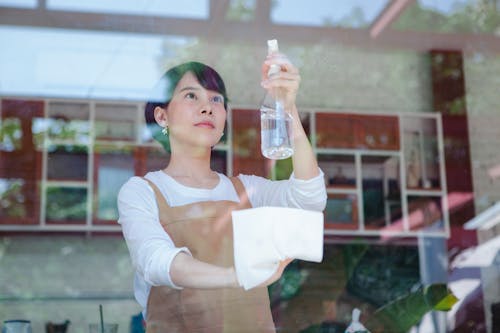
Additional Techniques for Stubborn Stains
Removing stubborn hard water stains can often require a bit more effort than traditional cleaning methods. Effective cleaning techniques such as using a razor blade scraper at a 45-degree angle can effectively lift tough deposits without scratching the glass surface. This method is especially beneficial for those particularly persistent stains that seem to resist typical approaches.
Another effective method for stubborn stain removal involves creating a paste from baking soda and water. Apply this thicker paste to the affected area and let it sit for a while before scrubbing gently. This mild abrasive action is complemented by the properties of vinegar, which is recommended for breaking down mineral deposits due to its acidic nature20.
For areas heavily affected, layering treatments can be useful. Alternating between vinegar and the baking soda paste allows for greater effectiveness over time. Additionally, using lemon juice provides a natural cleaning option thanks to its citric acid, which can help dissolve mineral deposits on glass20.
Don’t overlook other products available for stubborn stain removal. Shaving cream can prove to be an effective option in loosening these mineral deposits as well. Lastly, for a more unique approach, denture tablets dissolved in warm water can also be used to tackle these tough stains, illustrating the diversity of effective cleaning techniques at your disposal21.
When to Call a Professional
While many hard water stains can be tackled with DIY methods, certain situations call for professional cleaning. If stains persist despite various attempts, reaching out to an expert is wise. In areas where hard water is prevalent, many homes are fitted with water softeners to filter out minerals from the water supply. Sometimes, the typical hard water stain may be too old for home remedies like vinegar and water to work effectively22.
Professional window cleaners, such as Window Genie, possess experience and tools to ensure expert stain removal. These professionals can use specialized polishing pastes that effectively restore glass surfaces without causing additional damage22. For instance, some suburbs in the Twin Cities are known for having water hardness levels four times the national average, which can lead to significant staining on various surfaces23. In such regions, regular maintenance becomes crucial to prevent stains from becoming too difficult to remove23.
Leaving hard water stains untreated may result in long-term issues like window etching, caused by minerals permeating the glass surface23. Although many methods, such as rubbing alcohol and mild acids, like lemon juice, can help, their effectiveness might vary greatly. Moving into extreme cases, it may become necessary to grind, polish, and seal the glass24. Thus, for persistent issues or significant glass damage, seeking assistance from professionals can save time and ensure optimal results, allowing one to maintain the clarity of their glass surfaces222324.
Eco-Friendly Cleaning Alternatives
Choosing eco-friendly glass cleaners is an effective way to combat hard water stains while maintaining a sustainable home environment. Natural ingredients like vinegar, lemon juice, and baking soda serve as reliable options for those looking for sustainable cleaning options. For instance, a simple mixture of 1/4 cup vinegar combined with 1 cup water creates an effective glass cleaner that eliminates cloudy spots caused by calcium deposits typical of hard water25.
Commercial products that prioritize plant-based formulas are increasingly available, ensuring that cleaning tasks can be accomplished without harsh chemicals. Additionally, regular cleaning with a solution of 2 cups of water, 3 tablespoons of white vinegar, 1/2 teaspoon of washing soda, and 1/2 teaspoon of castile soap can help prevent buildup on glass surfaces26. Such sustainable cleaning options safeguard not only the environment but also enhance the quality of air in living spaces.
For those interested in DIY solutions, incorporating essential oils into cleaning recipes provides both fragrance and added antibacterial properties. Utilizing methods that involve natural ingredients fosters a greener lifestyle, making eco-friendly glass cleaners a premier choice for conscientious consumers seeking minimal environmental impact.
Understanding Glass Types and Cleaning
Different types of glass, such as tempered, laminated, or low-e glass, call for tailored cleaning techniques for different glass surfaces to avoid damage. Tempered glass offers strength and safety, yet requires specific cleaning methods to prevent scratching. Laminated glass often features a plastic interlayer, which can be sensitive to harsh chemicals and abrasive cleaners. Low-e glass has a special coating that enhances energy efficiency but necessitates careful consideration to maintain its integrity during cleaning. Understanding these types of glass significantly affects the approach you should take for effective and safe cleaning27.
For optimal results, always consider the manufacturer’s recommendations when determining the best cleaning techniques for different glass surfaces. Using improper tools or cleaning agents can lead to lasting damage, such as cloudiness or surface scratches. Products like Mr. Hard Water Protectant Sealant can be useful to slow the build-up of hard water stains28. Through proper knowledge and precautions, cleaning hard water stains effectively while maintaining the glass’s pristine condition becomes more manageable.
Maintaining Your Glass After Cleaning
After successfully removing hard water stains, consistent glass maintenance is vital for keeping glass clean and ensuring surfaces remain clear. Regularly utilizing mild cleaning solutions, including white vinegar, and drying surfaces after contact with water can greatly reduce the likelihood of new stains forming. Experts recommend products like LemiShine and Finish Hard Water Booster, both containing citric acid, which have proven effective for many users2930.
Incorporating preventive practices such as using a squeegee after each shower and applying a water-repellent treatment like Diamon Fusion® can significantly ease future cleaning efforts. Installing water softening systems can also diminish mineral content in the water, making it easier to keep your glass clean30. This combination of strategies results in not only a clearer view but prolonged intervals between cleanings.
A routine maintenance plan, integrating these techniques and quality cleaning products, ensures your glass surfaces stay sparkling, highlighting their clarity and appeal. By committing to these practices, you’ll find that maintaining glass after cleaning becomes a more manageable and effective part of your home care routine.
FAQ
Q: What causes hard water stains on glass surfaces?
A: Hard water stains are caused by mineral deposits, primarily calcium and magnesium, that are left behind when water evaporates. These stains appear as white, cloudy spots on surfaces such as shower doors, windows, and glassware.
Q: How can I remove hard water stains from my glass shower door?
A: You can remove hard water stains from a glass shower door by mixing equal parts of distilled white vinegar and water in a spray bottle. Spray the solution on the stains, let it sit for at least 30 minutes, then scrub with a soft-bristled brush before rinsing and drying.
Q: Are there any natural remedies effective for hard water stains?
A: Yes, natural remedies like vinegar, lemon juice, and baking soda can effectively tackle hard water stains. Mixing lemon juice with baking soda creates a paste that can be used to scrub the stains away safely.
Q: What commercial products work best for removing hard water stains?
A: Commercial products that contain acids such as hydrochloric or phosphoric acid are particularly effective in breaking down mineral deposits. Always follow the manufacturer’s instructions for safe and effective use.
Q: How can I prevent hard water stains from forming?
A: To prevent hard water stains, regularly dry glass surfaces after exposure to water using a squeegee or microfiber towel. Additionally, consider installing a water softener to reduce mineral content in your water supply.
Q: When should I consider calling a professional to remove hard water stains?
A: You should consider calling a professional if hard water stains persist after several attempts at removal or if there is significant damage anticipated, as they possess specialized tools and cleaning agents to restore glass surfaces without causing further damage.
Q: Are there eco-friendly options for cleaning hard water stains?
A: Yes, eco-friendly options include using natural products like vinegar, lemon juice, and baking soda. There are also various market alternatives that claim to effectively clean without harsh chemicals, making them suitable for environmentally conscious consumers.
Q: Do different types of glass require different cleaning techniques?
A: Yes, different types of glass, such as tempered or low-e glass, may require specific cleaning approaches to avoid damage. Always refer to the manufacturer’s recommendations for the best cleaning methods tailored to the glass type.
Q: How can I maintain my glass surfaces after cleaning?
A: To maintain glass surfaces, regularly clean them with mild solutions and dry them after exposure to water. Employ preventive measures like using a squeegee and applying water-repellent treatments to keep your glass looking pristine.

